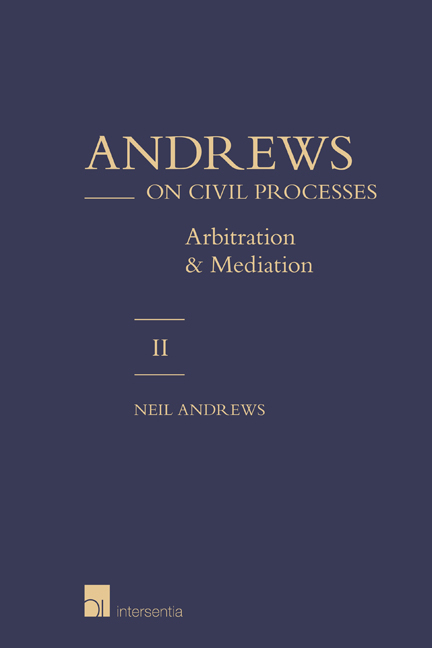Book contents
- Frontmatter
- Dedication
- CONTENTS VOLUME I
- Contents
- Table of Cases
- Table of Statutes
- Table of Statutory Instruments
- PART I MEDIATION
- PART II ARBITRATION
- Chapter 3 Commercial Arbitration: What Is It and Why Choose It?
- Chapter 4 The Major Principles of Arbitration and Litigation: A Comparison
- Chapter 5 Fundamental Features of English Arbitration
- Chapter 6 ‘The Seat’ and the Range of Relevant Laws
- Chapter 7 ‘Arbitrability’: Public Policy Limitations upon the Scope of Arbitration
- Chapter 8 A Confidential Process
- Chapter 9 Arbitration Agreements
- Chapter 10 Courts Giving Effect to Arbitration Agreements
- Chapter 11 Commencement of the Submission and Time Issues
- Chapter 12 The Tribunal's Appointment, Tenure and Immunity
- Chapter 13 Pre-Hearing Proceedings
- Chapter 14 The Hearing
- Chapter 15 Final Remedies, the Award, and Correction of the Award by the Tribunal
- Chapter 16 Fees, Expenses and Recoverable Costs
- Chapter 17 Arbitration Awards: Issues of Finality and Res Judicata
- Chapter 18 Challenges to English Arbitral Awards under English Law
- Chapter 19 English Enforcement of English Awards
- Chapter 20 Enforcement under the New York Convention (1958)
- PART III CONSUMER ADR
- Select Bibliography
- Index to Volumes I and II
Chapter 17 - Arbitration Awards: Issues of Finality and Res Judicata
from PART II - ARBITRATION
Published online by Cambridge University Press: 13 December 2017
- Frontmatter
- Dedication
- CONTENTS VOLUME I
- Contents
- Table of Cases
- Table of Statutes
- Table of Statutory Instruments
- PART I MEDIATION
- PART II ARBITRATION
- Chapter 3 Commercial Arbitration: What Is It and Why Choose It?
- Chapter 4 The Major Principles of Arbitration and Litigation: A Comparison
- Chapter 5 Fundamental Features of English Arbitration
- Chapter 6 ‘The Seat’ and the Range of Relevant Laws
- Chapter 7 ‘Arbitrability’: Public Policy Limitations upon the Scope of Arbitration
- Chapter 8 A Confidential Process
- Chapter 9 Arbitration Agreements
- Chapter 10 Courts Giving Effect to Arbitration Agreements
- Chapter 11 Commencement of the Submission and Time Issues
- Chapter 12 The Tribunal's Appointment, Tenure and Immunity
- Chapter 13 Pre-Hearing Proceedings
- Chapter 14 The Hearing
- Chapter 15 Final Remedies, the Award, and Correction of the Award by the Tribunal
- Chapter 16 Fees, Expenses and Recoverable Costs
- Chapter 17 Arbitration Awards: Issues of Finality and Res Judicata
- Chapter 18 Challenges to English Arbitral Awards under English Law
- Chapter 19 English Enforcement of English Awards
- Chapter 20 Enforcement under the New York Convention (1958)
- PART III CONSUMER ADR
- Select Bibliography
- Index to Volumes I and II
Summary
ENGLISH PRACTICE
In Nomihold Securities Inc v. Mobile Telesystems Finance SA (2012) Andrew Smith J held that an anti-suit injunction (10.23 ff) should be granted to prevent a party from pursuing a second arbitration designed to undermine and contradict the award in an earlier arbitration between the same parties. The judge held:
‘It is a breach of an arbitration agreement to bring proceedings to make an unlawful attempt to invalidate the award or to make a collateral attack on a binding judgment or award of a properly constituted tribunal.’
This decision is sound because the re-litigation would run contrary to the parties’ implied undertaking to adhere to the result of the arbitration in the first reference. Andrew Smith J noted Lord Hobhouse's statement in Associated Electric & Gas Insurance Services Ltd v. European Reinsurance Co of Zurich (2003: see also on this case 18.11 to 18.13): ‘It is an implied term of an arbitration agreement that the parties agree to perform the award’.
The Privy Council in Associated Electric & Gas Insurance Services Ltd v. European Reinsurance Co of Zurich (2003) held that issue estoppel can arise in arbitration, and this will be binding on a second arbitration panel seised with a matter on a related topic between the same parties. There had been earlier cases on issue estoppel in arbitration proceedings (see also 16.27, vol I). It should also be noted that issue estoppel is not quite as exacting as cause of action estoppel: unlike cause of action estoppel, issue estoppel can be relaxed in either of these situations: (i) there has been a retrospective change in the law which renders the point covered by issue estoppel ‘plainly’ wrong; or (ii) new evidence has emerged which ‘entirely changes the aspect of the case’, provided that, even if he had displayed ‘reasonable diligence’, the relevant party could not have discovered this evidence at the time of the earlier litigation (see also 15.73, vol I).
In Nomihold Securities Inc v. Mobile Telesystems Finance SA (2012) Andrew Smith J assumed that the rule in Henderson v. Henderson (16.55 ff, vol I) will apply if in arbitration X between A and B, B could have readily raised issue P, but did not do so; and then in arbitration Y between A and B, B attempted to raise issue P.
- Type
- Chapter
- Information
- Andrews on Civil ProcessesArbitration and Mediation, pp. 319 - 330Publisher: IntersentiaPrint publication year: 2013
- 1
- Cited by



